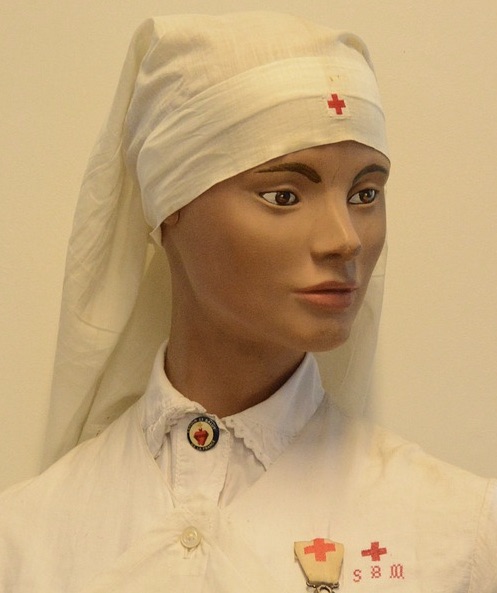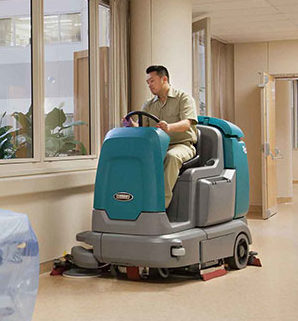Mannequin Monday – All the Prisoners Got One

Take me somewhere I’ve never been. This is what I look for in a story. Werner Sonne has written a fine novel on the post-WWII division of Palestine to create the Israeli state. This week on Mannequin Monday we clothe our story in the garb of an RN in a combat zone.
And I offer a story of a hospital worker’s act of kindness.
This Week’s Story
I recently read a fine novel titled From the Desert to the Sea. The following book blurb describes the story better than I can:
“Jerusalem, 1947: Judith, a young Jewish survivor of the Dachau concentration camp, arrives in Mandatory Palestine, seeking refuge with her only remaining relative, her uncle. When she learns that he has died, she tries to take her own life in despair.

After awakening in the hospital, Judith learns that Hana, a Muslim Arab nurse, has saved her life by donating her own blood. While the two women develop a fragile bond, each can’t help but be drawn deeper into the political machinations tearing the country apart. After witnessing the repeated attacks inflicted on the Jews, Judith makes the life-changing decision to join the Zionist fight for Jerusalem. And Hana’s star-crossed love for Dr. David Cohen, an American Jew out of his element and working only to save lives, will put her own life in danger.
Then the political situation worsens. When tensions erupt, a shocking act of violence threatens Judith and Hana’s friendship—and the destinies of everyone they love.”
One thing I always expect from a novel: will it take me somewhere I’ve never been before? This book aces that. The author, Werner Sonne, re-creates a world I knew little of. The bitter strife between Arabs and Jews in Palestine after WWII. Sonne does a fine job articulating the history.
I assembled a few quotes to illustrate the level of his writing and the intensity of the story. Writing book reviews does not come easy for me. This is simply my attempt to offer a few hints at what is a compelling story.
Hadassah Hospital is at the center of much of the story. As the character, Dr, David Cohen, describes it, “Hadassah Hospital is supported mostly by Jews from America, but we’re an open institution. We don’t discriminate…” This applies to both patients and staff, he says.
Judith is a Jewish woman, a survivor of Dachau, in Hadassah healing from a self-inflicted injury. An Arab nurse has donated blood to save Judith’s life. Dr. Cohen speaks to his patient Judith: “Then how about Nurse Hana looks after you for a bit? I mean, since it is her blood flowing in your veins.”
Judith has time to reflect as she lies in her bed. “Judith felt the bandage on her wrist. She had survived. But for what? At Dachau, she and the other prisoners, they had one goal. All they thought about was making it to the next day, and the one after that, and the one after that. They shared a kind of solidarity in their misery. Now, here she was, in a clean bed, but she had no goal. Make it to the next day for what? She was alone, alone in a strange land.”
Shortly after that, as Nurse Hana cares for Judith, she asked about the tattoo on Judith’s wrist. Judith pulls away. Shrinks back. But her heart cracks open.
“It’s from the concentration camp. All the prisoners got one.”
All the prisoners got one.
Hana gasped. “I didn’t know.”
“I know that you saved my life.” She thanks Hana for the first time.
Hana asked, “What was it like there? In the camp, I mean?”
“Judith’s head spun…the tears poured out…her body shook, like an earthquake. She wanted to scream…
Hana feels her pain. “I – I’m sorry.” She holds Judith in her arms.
I recommend the book strongly. A fine read.
My Current Writing
This week I tried a writing exercise suggested by author Ray Bradbury. It’s called Nouns and Titles. Make a list of nouns, possible book titles. Use the list to inspire a short story. Here’s my result:
Raul’s “Zamboni“
His name was Raul and he operated the Zamboni-like ride-on industrial floor cleaner that circulated through the hospital halls every day. Raul was a quiet man. He was concerned not so much for the patients in the rooms he passed. Rather, Raul cared more about providing clean floors for the patients and staff. His territory was the hallways and lobbies. Clean, disinfect, polish in a single pass. His eyes focused on the floors, the path of his machine. He rarely looked up, and so knew few of the nurses and aides by sight, let alone by name.
Raul was proud of his machine. His hallway floors were spotless. Any shoes with a grip sole, like a boat shoe, squeaked on the floor after he passed. Raul did not hear the squeaks. He heard only the hum of his machine.

The only sounds that penetrated his attention were the Code Blue announcements. Raul uttered a silent prayer each time he heard one of the announcements over the PA. He was not normally near any of the rooms when such an announcement came over the PA.
One Sunday, on his evening shift, he passed Room 634 just as the PA called a Code Blue there. Raul ran his machine to the end of the hall, turned around, and stopped. He saw the nurses and a doctor run into Room 634. He turned off his machine. Waited. Prayed.
He saw the doctor leave and hurry to the elevator. Two nurses came out, carrying cases, tossing used nitrile gloves into the trash bin. All was quiet for a moment. Raul started up his machine. Aimed it for the half of the hallway he had missed on his first pass. As he drew near Room 634, he heard a sob. A single sob.
A single sob
Again he stopped his machine. He dismounted, made sure it was turned off. He stepped into Room 634. The patient in the bed had a sheet drawn over the head. A woman stood next to the bed, tears running down her face. A nurse’s aide fussed over the woman, offering her tissues, a cup of water.
The aide saw Raul step in. She knew him by sight for all the times he had passed her as he cleaned the floors. The aide moved aside. Raul stepped up to the woman. She looked up, puzzled as to who he was. His workshirt bore a hospital logo, but she had no idea what his role was.
Raul took her hand softly in his. He motioned to the machine barely visible outside the room.
“I clean the floors,” he said in a hushed tone. “Tonight I will make sure they are extra clean when they come for your…”
“My husband,” the woman said.
“Yes, when they come for your husband. The floors will be clean.”
Raul stepped out of the room.
***
Leave a Reply